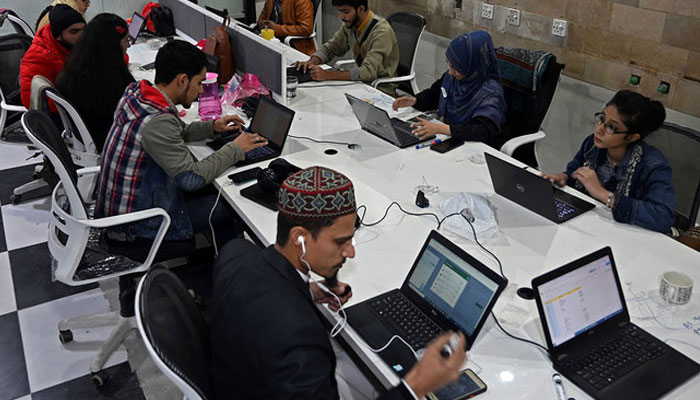Bridging Pakistan’s skills gap
LAHORE: The ability of our economy to compete globally depends on a sustained supply of talented and qualified workers. The imbalances occur when either the availability of such workers is inadequate or the skills they possess do not match the requirement of employers. This inadequacy puts immense pressure on the economy.
There dozens of people seeking jobs in Pakistan. However, most of them are unskilled. The dilemma of college graduates is that they are unable to secure well-paying white-collar jobs, which are already low in number. The other concern is that these graduates lack the right skills for jobs available in the industry. The Pakistani economy badly needs skilled workers.
Training unemployed people to equip them with in-demand skills is not easy even if the state provides the right funding and institutions for the right skills. The reason is that learning outcomes in our country are unsatisfactory, and when the basics are weak, it gets difficult to train people with new skills. Then, there are thousands of jobless college graduates or even Master’s degree holders who look away from mid-level skills and often waste years to find jobs they desire.
Addressing the skills gap and motivating unemployed people to acquire vocational training involves addressing social, economic and psychological barriers. There is a need to launch awareness campaigns that portray vocational skills as valuable and respectable -- highlighting success stories of skilled workers who have built sustainable careers.
Popular figures should be engaged to promote skilled professions, making these roles more appealing to young people. The state in collaboration with various skill-building institutions should organise seminars/conferences where skilled workers engage with the youth to discuss their experiences and the benefits of acquiring skills.
Skills should be imparted in fields where there are acute shortages so that job placements post-training through partnerships could be offered with industries looking for skilled labour. Guaranteed opportunities can be a powerful motivator. Skill development programmes should be scheduled where young people can work while they train, giving them real-life work exposure and motivation to earn.
The government should introduce skill-based subjects in high schools, so students begin seeing technical work as a viable career path from a young age. It could partner with universities to offer vocational certifications alongside degree programmes, allowing young people to earn skill-based qualifications without compromising their desire for a college degree; offer stipends to students who enrol in mid-level skill programs, covering their training costs and any initial income needs; and provide access to low-interest loans or government grants for students pursuing skill development programs. This financial support can remove barriers to entry for low-income youth.
Institutions should also offer online vocational training, so young people from remote areas or those with commitments can still acquire skills. Skill-building apps should be developed, which are mobile-friendly apps that teach mid-level skills interactively, enabling young people to learn at their own pace.
The state must set up incubation centres that help skilled workers start their own ventures, giving them the tools and business knowledge to succeed independently. Moreover, introduce employment programmes that prioritise skilled people over purely academic backgrounds. Skilled workers must be allowed to periodically attend advanced training that could help them progress to higher-level roles.
By implementing these strategies, youth in Pakistan can gain the motivation and support to pursue mid-level skills, creating a skilled workforce that can better meet the country’s economic needs and reduce youth unemployment that also threatens the social and political stability of the country.
-
 Hailee Steinfeld Reveals Her Plans To Return To Music
Hailee Steinfeld Reveals Her Plans To Return To Music -
 Elon Musk Unveils SpaceX Plan For Civilian Moon, Mars Trips
Elon Musk Unveils SpaceX Plan For Civilian Moon, Mars Trips -
 MTG Commander Banned Update: Wizards Frees Infamous Instant-win Card
MTG Commander Banned Update: Wizards Frees Infamous Instant-win Card -
 Royal Family Braces For ‘final Blow’ As Andrew Scandal Deepens
Royal Family Braces For ‘final Blow’ As Andrew Scandal Deepens -
 Snow Forecast Warns Of Reduced Visibility And Travel Risks In Ontario
Snow Forecast Warns Of Reduced Visibility And Travel Risks In Ontario -
 Margot Robbie Reveals 'worst' Gift She Received From Co-star
Margot Robbie Reveals 'worst' Gift She Received From Co-star -
 Casey Wasserman Says He ‘deeply Regrets’ Ghislaine Maxwell Emails After DOJ File Release
Casey Wasserman Says He ‘deeply Regrets’ Ghislaine Maxwell Emails After DOJ File Release -
 Discord Face Scan Age Verification Rules Explained As Platform Tightens Access
Discord Face Scan Age Verification Rules Explained As Platform Tightens Access -
 Cavaliers Vs Nuggets Showdown Heats Up After Blockbuster Trade
Cavaliers Vs Nuggets Showdown Heats Up After Blockbuster Trade -
 Where Kelsea Ballerini, Chase Stokes Stand After Second Breakup
Where Kelsea Ballerini, Chase Stokes Stand After Second Breakup -
 'Disgraced' Andrew Hit With Reality Of Life Beyond Royal Bubble
'Disgraced' Andrew Hit With Reality Of Life Beyond Royal Bubble -
 Thunder Vs Lakers: LeBron James Playing As Lakers Miss Luka Dončić
Thunder Vs Lakers: LeBron James Playing As Lakers Miss Luka Dončić -
 Pistons Vs Hornets Recap: Brawl Erupts With 4 Players Getting Tossed Before Detroit Victory
Pistons Vs Hornets Recap: Brawl Erupts With 4 Players Getting Tossed Before Detroit Victory -
 Gordie Howe Bridge Faces Uncertainty After Trump Warning To Canada
Gordie Howe Bridge Faces Uncertainty After Trump Warning To Canada -
 Air Canada’s Flights To Cuba Halted As Aviation Fuel Crisis Worsens
Air Canada’s Flights To Cuba Halted As Aviation Fuel Crisis Worsens -
 Marc Anthony Weighs In On Beckham Family Rift
Marc Anthony Weighs In On Beckham Family Rift




